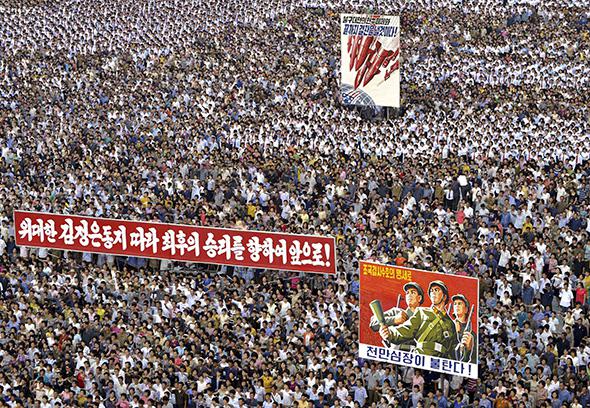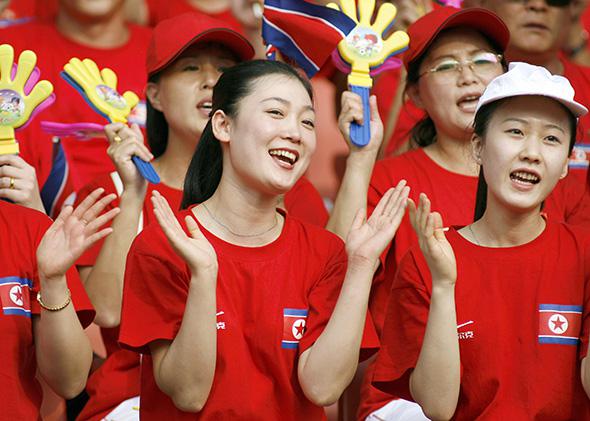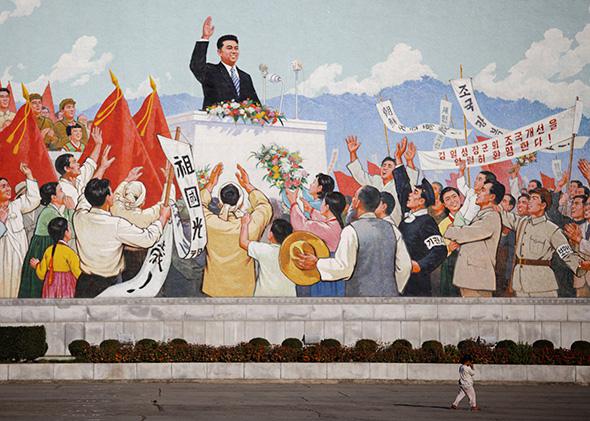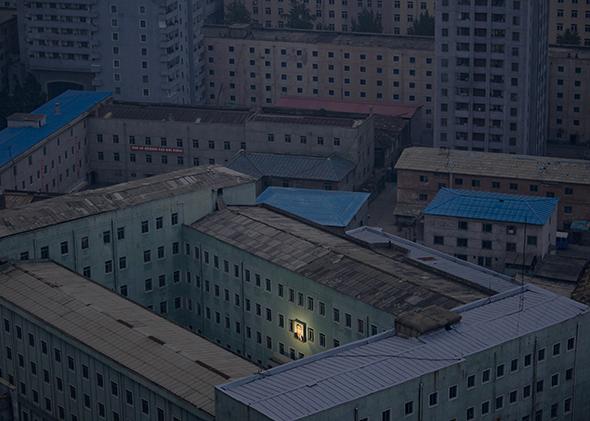Adapted from Without You, There Is No Us: My Time With the Sons of North Korea’s Elite by Suki Kim. Out now from Crown Publishers.
Essay was a much-dreaded word among my students. It was the fall of 2011, and I was teaching English at Pyongyang University of Science and Technology in North Korea. Two hundred and seventy young men, and about 30 teachers, all Christian evangelicals besides me, were isolated together in a guarded compound, where our classes and movements were watched round the clock. Each lesson had to be approved by a group of North Korean staff known to us as the “counterparts.” Hoping to slip in information about the outside world, which we were not allowed to discuss, I had devised a lesson on essay writing, and it had been approved.
I had told my students that the essay would be as important as the final exam in calculating their grades for the semester, and they were very stressed. Each student was supposed to come up with his own topic and hand in a thesis and outline. When I asked them how it was going, they would sigh and say, “Disaster.”
I emphasized the importance of essays since, as scientists, they would one day have to write papers to prove their theories. But in reality, nothing was ever proven in their world, since everything was at the whim of the Great Leader. Their writing skills were as stunted as their research skills. Writing inevitably consisted of an endless repetition of his achievements, none of which was ever verified, since they lacked the concept of backing up a claim with evidence. A quick look at the articles in the daily newspaper revealed the exact same tone from start to finish, with neither progression nor pacing. There was no beginning and no end.

Image by KCNA via Reuters
So the basic three- or five-paragraph essay—with a thesis, an introduction, a body paragraph with supporting details, and a conclusion—was entirely foreign to them. The idea they had the most difficulty comprehending was the introduction. I would tell them that it was like waving hello. How do you say hello in an interesting way, so that the reader is “hooked”? I offered many different examples, but still they would show up during office hours, shaking their heads and asking, “So this hook … what is it?”
One morning, they shouted, “We beat Japan!” in unison as I walked into the classroom. Their national soccer team, Chollima, had just beaten Japan’s Samurai Blue team in a World Cup qualifying match. The match had taken place at Kim Il-sung Stadium and had been televised live.
Here, the rage against Japan remained as vivid as when Japan had colonized Korea more than half a century before. The students were exuberant, proudly telling me about Jong Tae-se, their national team’s striker, and another one of their players who had been scouted by Manchester United. They did not acknowledge the fact that Jong was in fact a third-generation Zainichi Korean, a term used for ethnic Koreans born, raised, and living in Japan whose loyalty lie with North Korea. In their eyes, Zainichi Koreans were Japanese, their sworn enemy, and yet at opportune moments they considered them North Koreans. I knew better than to comment on that.
“How exciting!” I said brightly. “Wouldn’t it be great if Chollima makes it to Brazil for the World Cup?” They all nodded, smiling.

Photo by Liu Jin/AFP/Getty Images
It was not until later that day that I looked on the Internet (to which only the teachers were allowed access; the students were not aware of its existence) and learned that North Korea had already been knocked out, and the results had been announced some time ago. The match against Japan had to be played simply because it was a game owed. Either the students would not admit this, or they did not know the truth. Not only that, I learned that the game had not actually been televised live. Rather, it had been broadcast as soon as it ended, when the regime could be certain that their team had won. One student told me that it was very boring to watch only winning games. Moreover, no matter how hard I searched online, there was no mention of a North Korean footballer playing for Manchester United. As always, their government had sown misinformation, and my students’ claims lacked any basis in reality, so I could hardly expect them to back up their theses.
Instead of a lesson on sources, which was not possible there, I asked that they read a simple essay from 1997 that quoted President Bill Clinton on how important it was to make all schools wired. The counterparts had approved it because it related to our current textbook theme of college education. I hoped that they would grasp the significance of the Internet and how behind they were. I also gave them four recent articles—from the Princeton Review, the New York Times, the Financial Times, and Harvard Magazine—that mentioned Mark Zuckerberg, Facebook, and Twitter. None of the pieces evoked a response. Not even the sentence about Zuckerberg earning $100 billion from something he dreamed up in his college dorm seemed to interest them. It was possible that they viewed the reading as lies. Or perhaps the capitalist angle repelled them.
The next day, several students stopped by during office hours. They all wanted to change their essay topics. Curiously, the new topics they proposed all had to do with the ills of American society. One said he wanted to write about corporal punishment in American and Japanese middle schools. Another wanted to argue that the American government’s policy of deciding a baby’s future based on IQ tests should be forbidden. A third student wanted to write about the evils of allowing people to own guns so freely in America. A fourth student said biofuel was toxic and America was the biggest producer of it. A fifth wanted to change his topic to divorce. There was no divorce in the DPRK, but in America the rate was more than 50 percent, and divorce led to crime and mental illness, according to him. “So what happens when people are unhappy here after being married for a while?” I asked. The student looked at me blankly. Still another student wanted to write about how McDonald’s was horrible. The same student then asked me, “So what kind of food does McDonald’s make?”
One student asked me which country produced the most computer hackers; he had been taught that it was America. This question stumped me, especially since I had just seen a news item on CNN Asia about cybercrime by North Korea. Instead, I told him that computer crimes could be committed anywhere, by anyone, even a visitor, so it would be hard to pinpoint one country as the source.
Their collective decision to switch their essay topics to condemn America seemed to have been compelled by the articles about Zuckerberg. What I had intended as inspirational, they must have viewed as boasting and felt slighted. The nationalism that had been instilled in them for so many generations had produced a citizenry whose ego was so fragile that they refused to acknowledge the rest of the world.

Photo by Damir Sagolj/Reuters
My efforts to expand their awareness kept backfiring. When I had them write a paragraph about kimjang (the annual kimchi-making tradition), I was handed a pile of preachy, self-righteous tirades. Almost half the students claimed that kimchi was the most famous food in the world, and that all other nations were envious of it. One student wrote that the American government had named it the official food of the 1996 Atlanta Olympics. When I questioned him, he said everyone knew this fact and that he could even prove it since his Korean textbook said so. A quick Internet search revealed that a Japanese manufacturer had claimed that kimchi was a Japanese dish and proposed it as an official Olympic food but had been denied. Somehow this news item had been relayed to them in twisted form and was now treated as general knowledge.
To correct my students on each bit of misinformation was taxing and sometimes meant straying into dangerous territory. A colleague said to me, “No way. Don’t touch that. If their book said it was true, you can’t tell them that it’s a lie.”
Sometimes they would ask why I never ate much white rice. They piled their trays with huge heaps of it at every meal, whereas I always put just a little on my tray. I explained that I liked white rice but did not care for it all the time. They asked what kinds of food I ate other than rice and naengmyun, their national dish. I couldn’t exactly go on about fresh fruit smoothies and eggs Benedict, so I named two Western dishes I knew they had heard of: spaghetti and hot dogs. I knew that North Koreans enjoyed their own version of sausage because I had seen them lining up for it at the International Trade Fair. One of the students then wrote in his kimjang homework, “Those Koreans who prefer hot dogs and spaghetti over kimchi bring shame on their motherland by forgetting the superiority of kimchi.” Nothing, it seemed, could break through their belligerent isolation; moreover, this attitude left no room for any argument, since all roads led to just one conclusion. I returned the paper to him with a comment: “Why is it not possible to like both spaghetti and kimchi?”
After several lessons on the essay, a student said to me at dinner, “A strange thing happened during our social science class this afternoon.”
They never volunteered information about their Juche class, so I listened intently.
The student continued, “We had to write an essay!” He explained that they normally wrote short compositions in Korean, and he had never thought of them as essays before, but now he did, and it made him feel strange.
“What was so strange?” I asked.
“I don’t know,” he said, pausing thoughtfully. “I looked at it as an essay, and I realized that it was different now. Writing in English and writing in Korean are so different, but then it is also the same, and I kept thinking of the essay structure as I was writing it, and it made me feel strange.”
I did not question him further, but I thought I understood. It must have been deeply confusing to approach his writing on Juche like an essay. In his country there was no proof, no checks and balances—unless, of course, they wanted to prove that the Great Leader had single-handedly written hundreds of operas and thousands of books and saved the nation and done a miraculous number of things. Their entire system was designed not to be questioned and to squash critical thinking. So the form of an essay, in which a thesis had to be proven, was antithetical to their entire system. The writer of an essay acknowledges the arguments opposing his thesis and refutes them. Here, opposition was not an option.
I stared across at him and felt a familiar sick feeling. Perhaps this was only the beginning. The questions they would have. The questions they should be asking. The questions they would realize they had not been asking because they did not imagine they could, or because asking meant that they could no longer exist in their system.
Adapted from Without You, There Is No Us: My Time With the Sons of North Korea’s Elite by Suki Kim. Copyright © 2014 by Suki Kim. Adapted by permission of Crown Publishers, a division of Penguin Random House, Inc. All rights reserved. No part of this adaptation may be reproduced or reprinted without permission in writing from the publisher.
Correction, Dec. 2, 2014: This article’s headline originally misstated that Suki Kim taught English to graduate students in Pyongyang. She taught English to college students.
